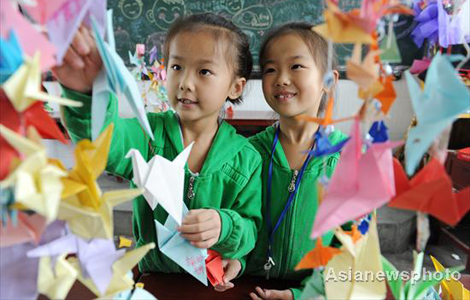Surging imports squeeze trade surplus in August
Updated: 2011-09-11 07:42
By Wang Wen and Ding Qingfen (China Daily)
|
|||||||||||
BEIJING - China's trade surplus for August fell sharply from July to $17.75 billion, the first monthly drop since February, as the nation's exports dipped and imports grew to a record high, official statistics showed.
The trade surplus last month was down from July's $31.5 billion, the highest in two and a half years. While the slackened global demand is pinching China's export growth, demand from the world's second-largest economy is still strong.
"Acceleration of import continues exceeding export's rise in the future," said Wang Tao, head of China Economic Research at UBS Securities.
China's exports surged by 24.5 percent year-on-year in August, accelerating from the 20.4 percent in July, the General Administration of Customs (GAC) announced on Saturday.
Despite the acceleration, the August figure fell to $173.31 billion from a record high of $175.13 billion in July.
Meanwhile, China's imports in August climbed 30.2 percent from a year earlier to a record high of $155.56 billion.
The debt crisis in European Union and the United States has dampened the global consumer confidence for Chinese goods, which leads to a slower expansion of the nation's exports than imports, experts said.
Statistics from the GAC showed that China's exports to the US and Japan in August gained by 12.55 and 29.8 percent year-on-year, up from 9.5 and 27.2 percent in July. Export growth to the EU for August stayed at the same level of July - 22.34 percent.
But compared with China's major trade partners, exports to some developing countries grew at a faster pace than developed economies.
Exports to Brazil and Russia rose by 39.75 and 34.1 percent in August, up from 23.7 and 19.6 percent in July.
While the global debt crisis is spreading and will slow the demand for China's goods, "emerging markets will become more and more significant to China," said Liang Ming, deputy researcher of the Chinese Academy of International Trade and Economic Cooperation (affiliated with the Minsitry of Commerce).
"Strong import growth is driven by China's strong domestic demand for consumer goods, luxury items, iron ore, crude oil, soy as well as corn," Shen Jianguang, an economist with Mizuho Securities Asia in Hong Kong, was quoted as saying by Reuters.
Price hikes also helped lift the value of China's imports, with coal and soybean rising by 11.9 and 31.2 percent year-on-year in price from January to August.
China's imports from emerging markets including Russia, Brazil, South Africa and India outperformed that from the developed nations of the US and Japan by terms of growth.
In August, imports from Russia increased sharply, 111.5 percent year-on-year, while imports from South Africa grew by 137.9 percent.
China Daily
Hot Topics
President Hu Jintao sent festive greetings to teachers ahead of national Teachers' Day, which falls on September 10, during his visit to Beijing No. 80 High School on Friday.
Editor's Picks

|

|

|

|

|

|







